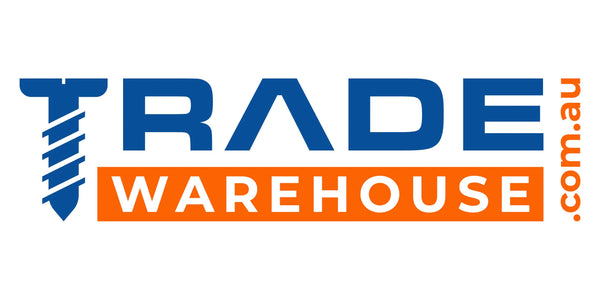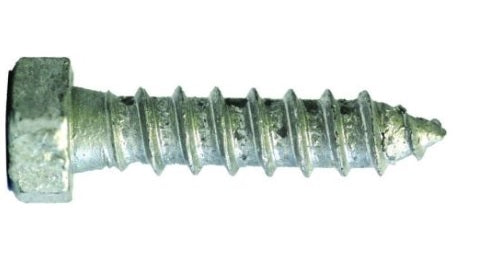When starting a construction project, you might want to know the best types of screws to use for specific materials. This will ensure you use the correct equipment that can ensure you create a quality project that's built to last. However, navigating the world of screws, bolts, washers, and nuts can be difficult, especially if you're just starting.
At Trade Warehouse, we pride ourselves on providing our customers with quality products at affordable prices. But what sets us apart is that we ensure you have all the information you need before you invest in any of our products. To help you get the most out of your coach screws, we've compiled this complete guide for everything you need to know about coach screws.
Today, we define a coach screw and explain its key features, as well as provide the many benefits of coach screws, the materials you should use them with, and answer some of your burning coach screw questions.
What is a coach screw?
Before we delve further into the main features and benefits of coach screws, it's essential that we first discuss what a coach screw is. A coach screw is a type of heavy-duty screw that either has a square or hexagonal head.
This screw has a tapered point, making it easier for DIYers like you to screw into materials like timber. Coach screws are sometimes known as lag screws and are well known for their durability and high tensile strength.
A lag screw or coach screw is an example of a single component screw with a single wood thread that is course, making it the best option for screwing into softer materials like timber. At Trade Warehouse, we offer an extensive range of galvanised hex head and hex head grade 4.6 zinc-plated screws for all your fastening needs.
Coach screws have a hexagonal head, meaning they're designed to be used in conjunction with a spanner, wrench or pliers. This makes it much easier to remove screws or secure them in place. Typically, coach screws are made of steel but can be zinc plated.
The cylindrical thread and sharp point mean that the screw bites onto the timber for a secure grip, making it the perfect screw for a super strong hold. On our site, you'll typically find coach screws in many different sizes, ranging from 6mm x 25mm to 12mm x 200mm.
Why are they called coach screws?
So, why are coach screws called coach screws? These screws and bolts get their name from their primary function, dating back to the 1800s. These screws were used in manufacturing old-time wagons and coaches, more specifically, their wheels. They've been called coach screws as a nod to their former function!
Types of coach screw
Of course, screws don't abide by a one-size fits all policy and have different features to suit different functions. To help you choose the correct screw, here's a quick guide to the types and their features:
- Zinc plated: We offer separate zinc-plated hex head coach screws with an essential protective coating to minimise wear and tear. These can be characterised by their bright zinc-plated appearance compared to other coach screw types.
- Hot dipped Galvanised Class 3: The hot dipped galvanised screw refers to the type of coating we use on our screws. Hot-dipped galvanised is the process in which the stainless steel screw is dipped into hot zinc to protect against corrosion. Therefore, hot-dipped galvanised is a weather-resistant coating that can enhance the strength of your screw.
What do we use coach screws for?
Usually, we recommend using coach screws for timber-to-timber applications. This is because the threads on the shaft of the screw provide a firm hold compared to other screws. So, this is the perfect screw for your DIY projects such as timber sheds, fences, and so much more.
You'll be happy to know that coach screws and lag bolts are load-bearing, typically used in heavy-duty projects. So, you won't need to worry about these screws not being able to handle a little extra pressure!
Benefits of coach screws
Here are some of the key benefits of using a coach screw:
Strength
Due to the shape of the shaft and hexagonal head providing compression, these screws are very strong. This means you'll be able to use a coach screw for parts of your project that see lots of use, such as joints or hinges.
Resistant to force
Another great feature of this screw is that it's resistant to force. The unthreaded part of the screw (just below the head) gives it much more strength against brute force, meaning it's less likely to fail under extreme pressure. Consider using a partially threaded coach screw over a fully threaded coach screw for more critical parts of your project.
Final thoughts
We hope you feel more confident in the type of coach screw you'll need for your project. Check out our full stock of coach screws and your construction equipment needs at Trade Warehouse.
Our online shop supplies high-quality products suitable for all your DIY and assembly needs. We offer nationwide delivery, so you don't need to worry about not being in a suitable location to collect your order! Why not check out our blog, where you'll find the best tips and guides to using our products?
Self-tapping
Due to its pointed, tapered end, a coach screw is self-tapping. That means you won't usually need a pilot hole to secure anything, saving you time and effort!
Coach bolts vs Coach screws
We use screws and bolts interchangeably, but while they may share similar names, coach bolts and screws are significantly different. These fasteners use different methods to secure materials in your project.
Bolts require a fastener such as a nut and threads to fasten them to wood. Coach screws have a tapered point and don't need any fastener to secure materials, whereas bolts have a flat end for a nut to secure.
Frequently Asked Questions
To help you understand coach screws to the fullest extent, we've compiled and answered some frequently asked questions about coach screws:
Are coach screws strong?
Yes! Coach screws are solid, making them the ideal screw for critical parts of a structure. Both coach screws and carriage bolts are suitable for load bearing, so you can put your faith in this heavy-duty screw.
Which materials should you use coach screws with?
Usually, you'll need to use coach screws with timber or securing metal to timber frames. In some scenarios, you can use coach screws and carriage bolts for masonry and concrete work, but we recommend a lag screw for timber work.
This is because the sharp point of the coach screw makes it much easier to secure without needing pre-drilling, although you may need to pre-drill a hole for your lag screw.
Do you need plugs for coach screws?
For heavy-duty applications such as installing heavy items in masonry, it's highly recommended to use a wall plug with your lag bolt and screws. This will help the screw grip onto the material and provide reliable hold.



